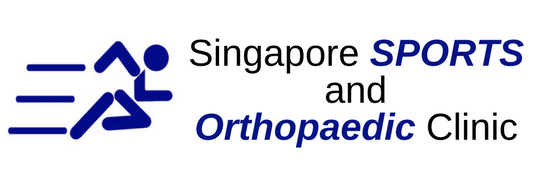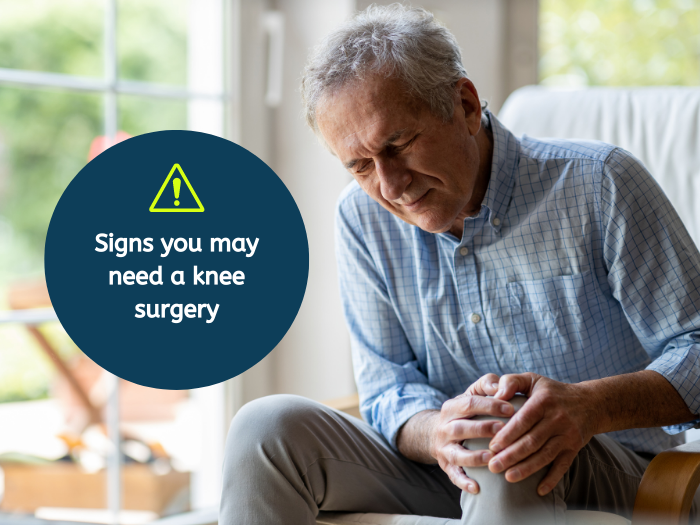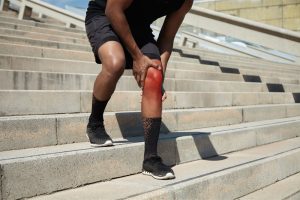Are you experiencing knee pain? Dealing with mobility concerns like stiffness on the knee? Taking a rest and applying a cold compress may not be enough.
But is it really time for knee surgery?
If all the conservative treatments stopped working, a knee replacement surgery would be the best choice to get back to life. According to the American Academy of Orthopedic Surgery (AAOS), it’s a safe procedure and has a very high success rate. The AAOS estimates that 90% of modern total knee replacements still work after 15 years.
You may need a little help after the surgery, but you should be able to begin walking either the same day or the day after surgery.
Many doctors mentioned that many of the patients told them they wished they had decided to get the surgery sooner. But before you go through the surgery, you have to make sure you’re a good candidate.
Is Knee replacement surgery right for you? Here are five signs to know if it’s time to sit down with your doctor:
-
Non-surgical treatment options are no longer working.
Taking your painkillers no longer works. When you have knee pains, your first relief may be a couple of ibuprofen and an ice pack. If any of these options have lost effectiveness and the pain is intolerable, it’s high time to check with your doctor. Although we don’t immediately suggest surgery, other non-surgical options for pain exist, such as physical therapy, orthobiologics, cortisone injections, or weight loss.
Surgery is rarely the first and only knee treatment option for lasting pain. Doctors will create tailored treatment plans to help assess your knee concerns and help you heal. A good example is cortisone injection, which usually lasts six months but only lasts for two weeks. You need to seek more options. When these non-surgical options don’t give you relief, it’s time to start a conversation with your doctor about that knee replacement.
-
Knee pain is getting worse and more frequent.
Having chronic knee pain may feel like a norm for you, but this isn’t usually the case. Pain may feel different for everyone but patients; you to pay attention to the following:
- Pain lasts for more than a couple of weeks
- Pain keeps you up all night
- Aches during and after exercise
- Pain does not respond to over-the-counter (OTC) medications such as ibuprofen and acetaminophen
- Pain gets a lot worse during cold weather
Pain can be a sign of wear and tear of your joints. It becomes more complicated for knee replacement surgery and recovery when your joints become more worn out. So, if it gets worse and is more frequent, have it checked for other non-surgical treatments. Otherwise, consider knee surgery and see if you are a candidate for a replacement. You can time your knee replacement surgery effectively and benefit from the procedure.
-
Swelling in your knees
Osteoarthritis, wherein the protective cartilage that cushions the ends of the bones wears down over time, can cause the cartilage to wear out. Cartilage helps protect your knee from pressure and friction caused by walking.
Arthritis is painful, and it often leads to inflammation. If you are experiencing recurring knee swelling, never overlook it. It can cause immobilization and increase your pain. Swelling can be a sign of cartilage damage, leading to more wear and tear. Visit your doctor immediately and seek advice if you are a candidate for knee replacement.
-
Increase in Limited mobility and difficulty in doing daily activities
As you grow older, it is prevalent to lose joint flexibility, but persistent knee stiffness can signify a more complicated condition. The most common mobility issues in patients before discussing knee replacement surgery are:
- Morning knee stiffness lasts for 30 minutes or more
- You have difficulty walking up and down the stairs or standing up and down the chair
- It becomes worse over a prolonged period of sitting or standing, like during a long drive
- It may require you to use a cane to walk or stay mobilized.
There must be a problem if you’re having trouble even doing the basic household chores such as getting dressed or standing up for a while or taking a walk outside. Addressing these concerns at the earliest possible time can quickly help you get back on track.
When you lose your mobility, you become more inactive. Inactivity could lead you to more joint function concerns and muscle strength decline. Losing too much strength and function results in slow recovery after a knee replacement, and you may not get the maximum benefit of the surgery.
-
Doing the things you love to do becomes tedious.
If you often walk at night in the park or cycle every weekend, and you suddenly stop because of your annoying knee pain, then make sure to have it checked immediately. Your life shouldn’t stop because of the knee pain because it will also make your overall welfare problematic. It creates depression. Furthermore, you can’t enjoy the things you used to do.
Talk with an orthopedic doctor and seek medical help immediately. The orthopedic specialists at Singapore Sports and Orthopedic Clinic specialize in working with people from many walks of life. Whether you are an athlete, an office worker, or a teacher, our doctors can work with you and create a plan that fits your lifestyle and needs.
Are the signs present from any of the options above?
If any of the signs are present and all the non-surgical methods fail, it’s time for you to book an appointment with our Orthopedic doctors and weigh your options. The doctors will examine you and perform an evaluation such as MRI or X-ray tests. You will be required to inform them of the activities that you often do so they can assess how they can help you. Our doctors will find the best possible solution for your troubles and help you lessen post-surgery risks, and increase your recovery process.
Still exploring treatment alternatives for your knee pain? Book an appointment today or you may contact us through Whatsapp at +65 3135 1336.
If you are an overseas patient, you can also book a video consultation. We never push our patients towards surgery, but we will ensure that we provide you with the best treatment plan and help your recovery as quickly as possible with your preferred option.








